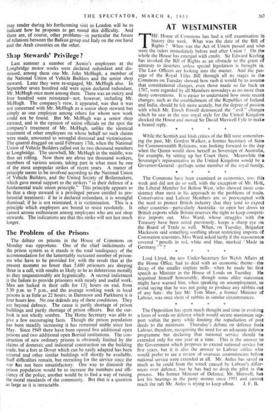The Problem of the Prisons
The debate on prisons in the House of Commons on Monday was opportune. One of the chief indictments of the prison system as it stands is the total inadequacy of the accommodation for the lamentably increased number of prison- ers who have to be provided for, with the result that at the present moment no fewer than 5,680 prisoners are sleeping three in a cell, with results as likely to be as deleterious morally as they unquestionably are hygienically. A second indictment is the failure to provide prisoners with steady and useful work. Men are locked in their cells for 131 hours on end, from 5.30 p.m. to 7 p.m., and the average working week in local prisons is as little as 22 hours; in Dartmoor and Parkhurst it is four hours less. No one defends any of these conditions. They are beyond defence. The cause is partly shortage of prison buildings and partly shortage of prison officers. But the out- look is not wholly sombre. The Home Secretary was able to give a few encouraging facts. Though the prison population has been steadily increasing it has remained stable since last May. Since 1949 there have been opened five additional open prisons and two additional open Borstal institutions. The con- struction of new ordinary prisons is obviously limited by the claims of domestic and industrial construction on the building trade, but a fort at Dover which can be easily adapted has been secured and other similar buildings will shortly be available. Staff difficulties remain, but recruiting for the service since the war as not been unsatisfactory. One way to diminish the prison population would be to increase the numbers and effi- ciency of the police, another would be to find a way of raising the moral standards of the community. But that is a question as large as it is intractable.


































 Previous page
Previous page